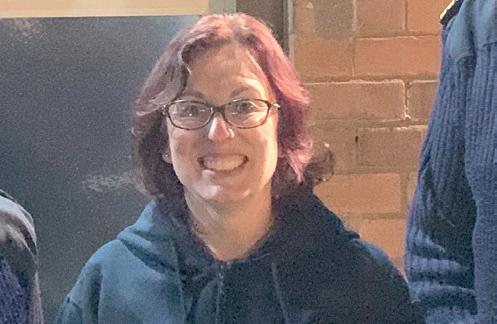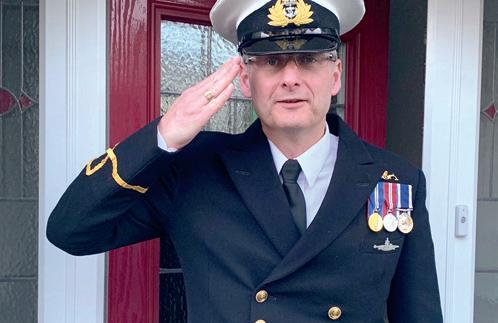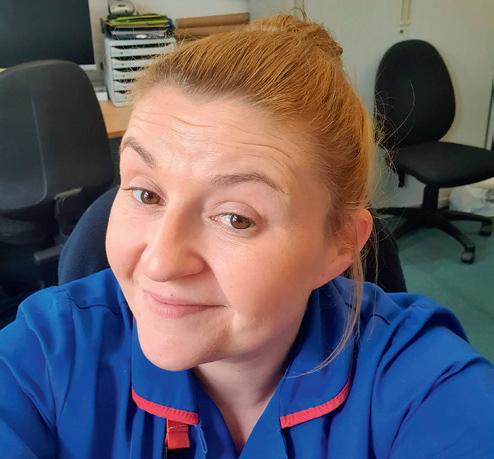
7 minute read
To see if it’s right for you, look at the course requirements – like what other
OUR AMAZING VOLUNTEERS
Virtual volunteering
While face-to-face meetings, parade nights and training weekends were all suspended, that doesn’t mean Sea Cadets was closed for business. We speak to three resourceful volunteers to find out how they sprung into action to bring the Sea Cadets experience to young people during lockdown… all while juggling their day jobs on the front line
Meet three sea cadets volunteers who are also key workers
ALISON KENNEDY
Day job: Emergency ambulance technician Sea Cadets role: Lt (SCC) RNR Assistant District Officer, Sussex District are to the Sea Cadets experience. Their commitment helps young people across the country flourish. While lockdown measures put typical cadet activities on hold, this didn’t stop our tireless volunteers. We spoke to three of them (including a husband and wife) about fitting in volunteering with their jobs on the front line. How much has work life changed? HR: I’ve worked in critical care for 25 years but the first few weeks of the outbreak were challenging. At University Hospitals Birmingham we‘ve cared for more than 3,000 Covid-19 patients and 300 in critical care. While this number isn’t unusual, normal roles are on hold. The teamwork has been phenomenal. SR: I work in an immediate response role. While the general focus has not changed, the workload has increased massively. Communication and negotiation is at the heart of police work and PPE makes it more difficult. What does volunteering currently look like? HR: When lockdown began, I was perhaps naively enthusiastic about what we could achieve. Lots of volunteers are key workers and being pulled in different directions. But we’ve been inspired by
HEATHER READING
Day job: Advanced critical care practitioner Sea Cadets role: Unit Management Team, Leamington & Warwick Sea Cadets other units and we’ve hosted online hangouts so cadets can see each other and chat. SR: I like to see the cadets progress one rank each year so I’m keen that they continue with their Cadet Training Programmes. AK: As an Assistant District Officer, I’m not in direct contact with cadets. But, I am able to support them through writing remote lessons and quizzes. I hold regular Skype sessions with the district team and volunteers. Does your unit #ClapForCarers in uniform? SR: We do this on our Divisions night, when cadets put on their number one uniform. Our first one took place at the end of April and lots of cadets took part. One of them made a collage of pictures of the event, which was great – it also gave me the opportunity to see if their uniforms fit and the badges are in the right place! Has volunteering helped you during the crisis? AK: Sea Cadets has been great for my wellbeing. Dealing with the crisis is a daily occurrence and can be quite upsetting. So getting on and being able to write lessons, set quizzes and meet virtually is a great distraction. HR: It’s nice to think of something else when we come home from work. But dealing with highly stressful situations is something we’re used to. Nominate a volunteer! Email us at
SCmag@ms-sc.org
and tell us who it is and

We all know how vital volunteers
why they deserve it

STEPHEN READING
Day job: Police officer Sea Cadets role: Sub-Lt (SCC) Commanding Officer, Leamington & Warwick Sea Cadets
SR: It does take your mind away from work and the cadets who are engaged really want to be there, even remotely, so that positivity rubs off.
Do you think cadets are finding solace in it? AK: The fact that Sea Cadets has continued to give vital support to young people at this time is great. Without school, young people lose access to their support network, and many struggle even without the fear and isolation of Covid-19. Seeing cadets on group video calls has proved how valuable our charity is to them. Seeing them interact, laugh and submit coursework is great. HR: Sea Cadets instils confidence, selfsufficiency and resilience in young people and undoubtedly our cadets are able to use these life skills to navigate the current challenges we face.
What are you most looking forward to when we can go back to face-to-face Sea Cadets? HR: Definitely getting back to the fundraising. As a UMT, this is a huge part of what I do. We’re also a band unit and I can’t wait to see our talented cadets get out there and entertain again at local events and festivals. AK: Helping cadets to recover from this. I’ve volunteered for nearly 30 years and I’m excited to get back to seeing our young people progress and enjoying the journey.
So you want to be... A NURSE
Empathy, teamwork, communication: sea cadets have all these skills and more, making them perfect candidates for a career in nursing, says Practice Education Facilitator Tracy-Anne Southernwood
Three ways being a sea cadet can help you find a career in nursing
1Initiative is crucial to a successful career in nursing and something cadets know all about. They understand when it’s time to roll up their sleeves and get stuck in, which is a very useful asset on the hospital wards.
When I fell in love with nursing When I started as a healthcare assistant at the age of 20, about 18 years ago, I really didn’t know what I was getting into. But as soon as I started, I loved it. The ward I worked on was able to send me off for nursing training. Over time, I worked my way up to Deputy Sister then took up the role of Practice Education Facilitator (PEF) two years ago, so I can train others. Now I can’t imagine not being a nurse.
What a typical work day looks like Well, work has been quite interesting over the past eight weeks, so a typical day doesn’t really exist at the moment. But in normal circumstances, my main duties are to support student nurses on their placements, teach a variety of clinical skills and make sure they’re qualified and safe to embark on a career in nursing.
How we’re coping with COVID-19 I’m used to doing a lot of teaching but right now, I’m doing a lot of learning too. Our understanding of the virus is constantly

Working in a hospital is just one career path in nursing
2Communication – whether it’s between cadets or with superior officers, cadets know how to speak to all sorts of people. Nurses have to communicate with patients, relatives, consultants and colleagues.

3Management of other people and oneself is something that’s ingrained in cadets from day one. Nurses also need to draw on these leadership skills to stay calm and clear-headed in stressful situations.
changing so we need to be adaptable. I would usually work 8.30am–4.30pm Monday to Friday, but we’re doing a lot more hours at the moment. Lots of our third-year students would normally be in placement but, with COVID-19, they are looking at more acute patients and being put in highrisk situations themselves. We are all shattered, particularly after a full day in PPE, but it’s part of the job and I wouldn’t want to do anything else.
Why cadets are perfect for a career in nursing I’m Officer in Charge at Colchester Unit and almost everything a cadet does sets you up for a successful career in nursing. A lot of cadets have done first aid courses, but it goes beyond that: they have good communication and management skills, they’re empathetic and work well in teams, they have initiative and understand the importance of getting involved and getting their hands dirty. These are highly valued and desirable skills in nursing.
Why nursing is a great career There are so many different types of nurses, and so many career paths you can take. You can work on a hospital ward or in the community, in intensive care or an operating theatre, with babies or older people… the possibilities are endless. There are always pressures and challenges, but I love the fact that I’m helping people and that’s what’s kept me in nursing for so long.
How to get there
There are two main pathways into nursing…
UNIVERSITY You will need a degree in adult nursing which is approved by the Nursing and Midwifery Council. Full-time courses usually take three years and you will need four or five GCSEs at grades 9 to 4 (A* to C), or equivalent, including English, maths and science and two or three A-levels, including a science, or a level 3 diploma, or access to higher education in health, science or nursing. Visit nmc.org.uk/education/approvedprogrammes or ucas.com to learn more.
APPRENTICESHIP You can gain a degree apprenticeship in nursing if you work in a healthcare setting, like a hospital, and have the support of your employer. They usually take four years and combine study with on-the-job training. You’ll need four or five GCSEs at grades 9 to 4 (A* to C) and A-levels, or equivalent. Find out more: gov.uk/apply-apprenticeship.
Get started
To find out more about a career in nursing, from starter salaries to career opportunities, visit nationalcareers.service.gov.uk/jobprofiles/nurse.




